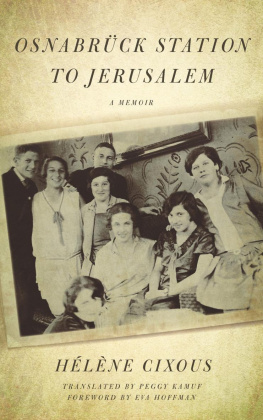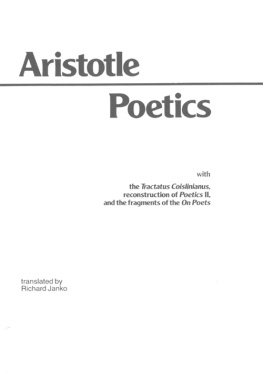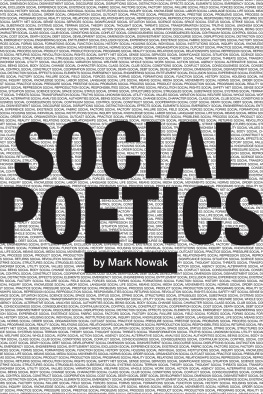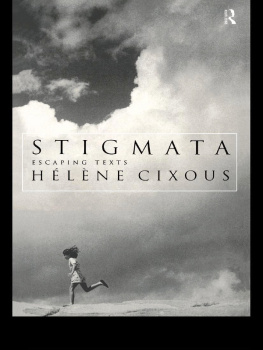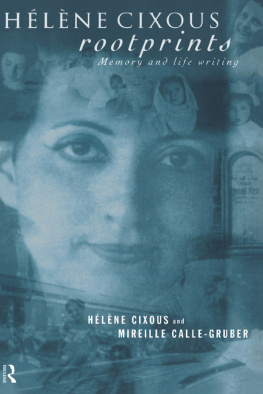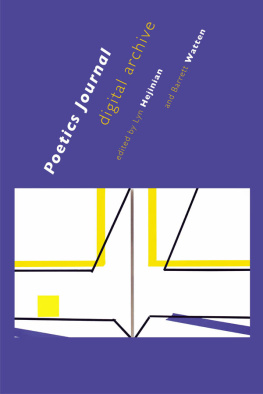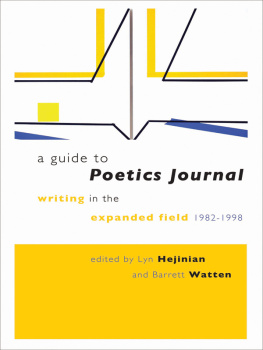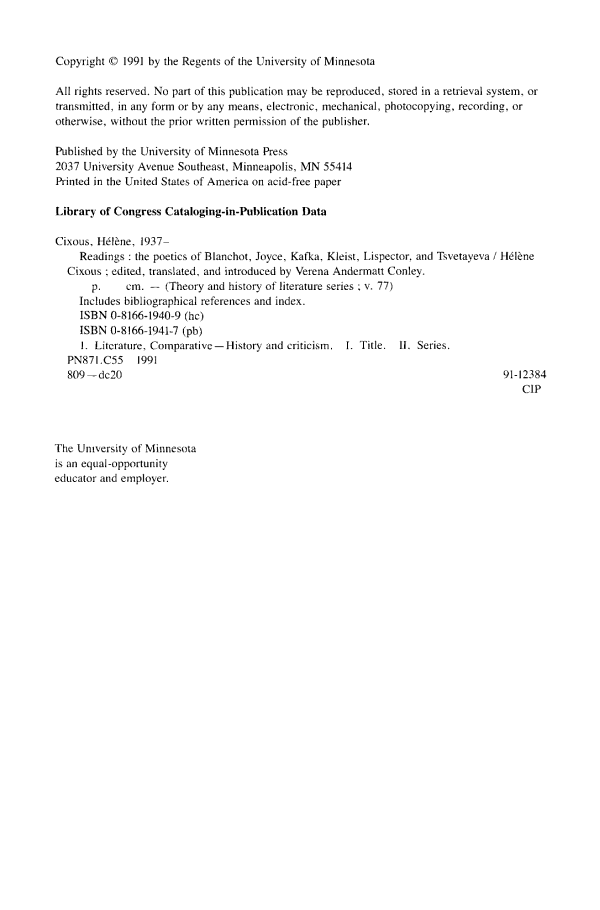Acknowledgments
My indebtedness goes to Helene Cixous, whose readings are the basis of this project.
As for the first volume, Reading with Clarice Lispector, I would like to express my gratitude to Iowa State University and James Dow for making the initial stages of this project possible through a summer grant. My thanks to Miami University of Ohio for providing me with the generous award of a research leave leading to its completion.
Special thanks go to Marguerite Sandre for her patient recordings and her general help, to Claudia Guimaraes for helping me with the Portuguese translations, to Susan Bennett for her help with the Russian translation and bibliography, and to Audrone Willeke and Ed Plater for providing bibliographical information on Kleist's translations.
I would like to thank David, Francine, and my parents for their patience, and above all Tom Conley for his continued assistance and especially for his wonderful sense of Irish humor.
Introduction
The present volume can be read side by side with Reading with Clarice Lispector (University of Minnesota Press, 1990). The readings included were given in seminar form by Helene Cixous between 1980 and 1986 at the Universite de Paris VIII, at the Centre d'Etudes Feminines. The selections are my own, except for the passages on Kleist that Cixous wished to have included. The organization into chapters, as well as the selection of about 600 pages for the two volumes from among the original 2,500 pages, are also my own. I kept those passages that seemed the most significant at times the most controversial of Cixous's thought. Much of the material under discussion all eminently readable because of the pedagogical tenor of the seminars is elsewhere transformed poetically in her fictional writings. In these pages she explains what her fiction performs. The seminars can be read as laboratory for Cixous's fictional and critical practices.
Given the oral nature of this material, the problems in translation, as outlined in the first volume, have to do mainly with recurring expressions. To avoid excessive repetition, I have modified some of the prevailing use of the ilya. For Cixous, the deictic expression ilya constitutes a statement of no origin that brings with it a gift of language. The implied sense of a gratuitous "giving" has had to be somewhat attenuated. A number of other expressions also remain difficult to translate. For example, du cote de, "on the side of," is one of Cixous's favorite formulas, used in the context of her simultaneous reading of several texts at once. It was rendered variably as "in the direction of," "toward," or "leaning toward." Etre dans quelque chose, "to be into something," which has a colloquial ring in English, has been changed to "to engage in" or other synonyms. The neo-Hegelian expression, travailler sur quelque chose, "to work on something," has been transposed as "to study," "to explore," or "to see." For the literary texts discussed by Cixous, at times I have modified the English translations to make them correspond more closely to her own readings, which are based primarily on French translations, especially where the latter seem closer to the tenor of her analyses.
A result of Cixous's reading practices, the juxtaposition of texts in the two volumes across centuries and national boundaries opens possibilities of multiple readings in various directions that acquire many shadings, flickers, and refractions. Cixous's reading of texts side by side, at times dialectical by implication (for example, in the chapter on Blanchot and Lispector), is always in movement and prevents mastery or appropriation of the text by the reader. The primary carrier of Cixous's readings is an ongoing interest in poetry attached to the proper name of Clarice Lispector, whose texts are read alongside those of Joyce, Kafka, Kleist, Blanchot, and Tsvetayeva. Many of these proper names have crisscrossed Cixous's texts since the beginning of her career as a writer. Lispector has been a concern for a number of years, but the shift toward Eastern Europe is recent and now (in 1990) indicates how artists' interests announce political events that follow. If the texts chosen by Cixous reflect in various ways a preoccupation with writing as well as an insistence on pleasure, they are also linked to current issues in literary theory. Cixous's analyses offer at times welcome divergences from more established canonical lines. She takes up now-consecrated literary figures, mainly from the past. Rarely do her analyses extend to contemporary culture in a specific sense. She chooses to stay within the aura of what she calls "poetic writing." Cixous's purpose in these seminars seems twofold: to essay certain kinds of textual readings without advocating a style or a simple interpretation; and to develop further discourse concerning ethics.
Despite a synchronic approach to the texts and a concentration on generations of writers rather than surrounding facts (dates, sources, filiations) or, more broadly, literary history, nevertheless a shift in interest emerges between 1980 and 1986, from work on the origin of writing and the primal scene, or love and the gift, to problems of history. There is an avowed change, in Cixous's terms, "from the scene of the unconscious to that of history." The artist is now viewed caught in historical turmoil. But emphasis is still placed on the scene, on the word and poetry, on topics that do not immediately mobilize an overt activism. Cixous's general, almost cliched pronouncements on history may startle the reader but her close readings of texts are always compelling.
Next to a growing interest in cultures of the Third World (here in the seminars mainly those of South America), the holocaust, and Eastern European countries, something else now comes forward, in the apres-coup, that is manifested in her strong affiliation with the Jewish question and with its cultural representatives past and present Freud, Kafka, Lispector, Celan, Derrida, and others. The question is treated mainly in Cixous's association of Jew and poet. Through the wandering Jew and the poet given over to wandering, outside society, Cixous asserts her own belief in a poetic absolute. Here too one can sense a shift, moving away from an earlier need to disconcert the reader, toward a search for a technique that would best render, if not an adequation, at least a proximity between life, milieu, and writing. Poetry is not understood as subversive, as a "revolution" in and of language, but as that which precludes strategies of capture or containment and that contrary to philosophy allows for otherness. Cixous's belief in the virtues of poetry in its largest sense is much opposed to the development of a certain prose common to modern technocracies, in which discourse favors the efficacy of clarity and the pragmatics of meaning and fills all the gaps and fissures for the purpose of appropriation. F'oetry, not in its Apollonian form but as a residue of Dionysian culture, insists on a necessary part sauvage.
Her emphasis on poetry points to a tradition that can be traced across time but that has become particularly marked since the early nineteenth century; this tradition invokes attention to nature, the literary absolute, and a view that art must take a leading role in social change. These traditions are glimpsed through the names of Schiller, Schelling, and others. This also suggests why Cixous and a longstanding literary relationship with James Joyce and


